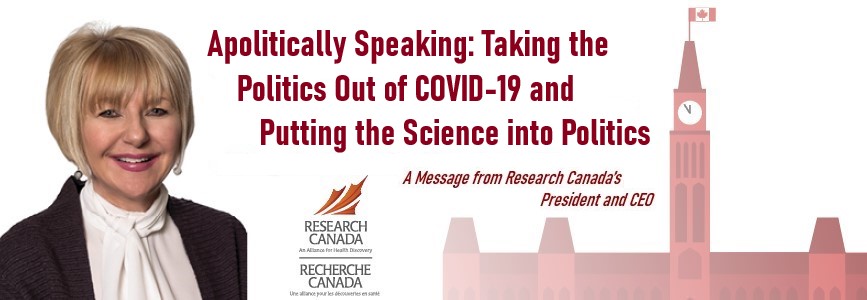

May 11, 2020
“The political legacy of the Enlightenment, with its focus on civic authority and rationality, has together with the rise of Western industrial societies engendered the need for scientific expertise and can be seen as the source of the modern cultural ascendency of science that has brought a notion of truth as a ‘sound knowledge’.”Truth, Politics and Democracy: Understanding Post-Factual Times
European Consortium for Political Research
“Political parties are essential instruments in the working democratic representative government,” said F.H. Underhill, the Canadian journalist, essayist, historian and past Chair of Carleton University’s Department of History. He goes on to say that, “If public opinion, upon which democratic government is supposed to be based, is to express itself in any coherent and intelligible form, the public must be able to make intelligible choices among competing candidates and competing policies.”[1]
As engaged advocates for Canadian health research and health innovation, we would all agree with Professor Underhill. There is no question that there is a role for us right now during the COVID-19 pandemic. We can bring scientific expertise within our respective sectors to the table and offer an evidence-based roadmap to our politicians through these uncertain times.
Competing directives and messaging during a pandemic, however, can be dangerous and the public has less patience for politicking when their lives and those of their loved ones hang in the balance. They prefer the straight talk science can offer.
For the most part, Canadian politicians have kept their politics away from the daily public health briefings letting the medical professionals and scientists provide directives to Canadians. And so it should be. Responding successfully to a pandemic happens only when political leadership is thoughtful, guided by science and forward-thinking. Canadians are watching as Americans are plagued by COVID-19 conspiracy theories, misleading information and false cures, which have left our neighbours to the south confused, unprepared and, in some cases, harmed.
If we are doing better in Canada, though, it will only be for so long. The nature of politics, for better or worse, is that it is part of everything we do. So, if we cannot keep politics out of science then our only option is to better integrate science into our politics so that the latter is kept informed.
There is a considerable gap between the scientific and political spheres, and some might say a systematic exclusion of science in our political system. Although we have made some important headway on this front in Canada over the past few years, there is still underrepresentation of scientists in both Parliament and government. As Ian Boyle has said, “Aristotle saw politics as legislative science or learning by experience. Politics was itself a scientific inquiry, thus reversing the current maxim that science lies outside politics. In Aristotle’s world, scientists would be those who designed policies to solve tricky problems.”
One of COVID-19’s lessons to lobbyists like myself, is that we must address the underrepresentation of science within our Parliament and our government. Scientists can bring a much-needed diversity of intellectual approaches to our body politic that challenge vested interests. But how can we do this in more concerted ways?
On the academic side, we have to start with integrating public policy communication into academic training and developing professional incentives for researchers to engage in policy and public engagement training. In terms of Parliamentarians, we have to establish science literacy opportunities, including organizing events on the Hill where Parliamentarians can meet health researchers and health innovators in one-on-one exchanges. Research Canada’s Parliamentary Health Research Caucus is integral to helping Parliamentarians understand the scientific landscape in Canada. Through our events on the Hill, researchers can talk directly to Parliamentarians about their research and why it matters to Canadians, winning hearts first and minds later with their research data focused on health outcomes.
Since COVID-19, Research Canada has continued to inform Parliamentarians, through our Monthly Media Digest for Parliamentarians about the health research and health innovation our member institutions are carrying out across the country. Over the next few weeks, we will continue to give Parliamentarians the opportunity to meet our best and brightest health researchers and health innovators through a series of COVID-19 Virtual Panel Presentations beginning with Against the Clock: COVID-19 Vaccine and Treatment R&D in Canada which our Members, Supporters and Partners can preview on May 21, 2020 at 1 pm ET. For more information and to register online, please visit rc-rc.ca/virtual-panel-covid-
Some Members on the Front Lines: Transitioning to Digital Health
Recently, I worked with Research Canada’s Policy Advisor, Dr. Ryan Wiley and his team at Shift Health to write an editorial for the Canadian Science Policy Centre on The End of the Beginning of Health Digitization. “Our experience over the past few weeks is shedding light on the power of data and digital tools to enable real-time decision-making, drive innovation, empower patients and ultimately protect and improve health and wellbeing—and it is also exposing in stark relief the work that remains on the journey toward healthcare digitization.”
Many of Research Canada’s Members have stepped up to this challenge and are already using digital technology in innovative ways to deliver and advocate for quality health care for Canadians. Here are just some examples!
- Innovative technologies have already been revolutionizing diabetes care in recent years, and JDRF Canada’s nation-wide campaign, #AccessforAll, is advocating to make this technology more affordable and accessible for patients.
- March of Dimes Canada has launched an emergency campaign to raise awareness and funds for urgently-needed online and telephone-based programs and services for Canadians living with disabilities.
- Mood Disorders Society of Canada will be hosting a live Facebook event on May 30th in support of Defeat Depression Day.
- The IWK Health Centre in Halifax is now offering virtual mental health care to Nova Scotia children, youth and families.
- Ottawa’s Children’s Hospital of Eastern Ontario (CHEO) has opened the first virtual pediatric emergency room in Canada.
- Toronto’s Centre for Addiction and Mental Health (CAMH) has successfully expanded virtual care to meet the demand for mental health services.
- Therapy dogs at the University of Saskatchewan and Carleton University have gone virtual to provide students with support.
A Final Thought
COVID-19 has taught us many things, not the least of which is that in times of crisis the constructive integration of scientific evidence into political decision-making engenders the public’s trust in our political leaders, strengthens people’s resolve to do their part and gives us an informed and trusted pathway through crisis. In the end, people do not need certainty or assurance that this will all end soon. People need the truth, and science is aimed at truth as its final goal.
Stay strong, be healthy and take science with you wherever you go.
[1] F.H. Underhill, Canadian Political Parties (1974, Fifth Printing)

